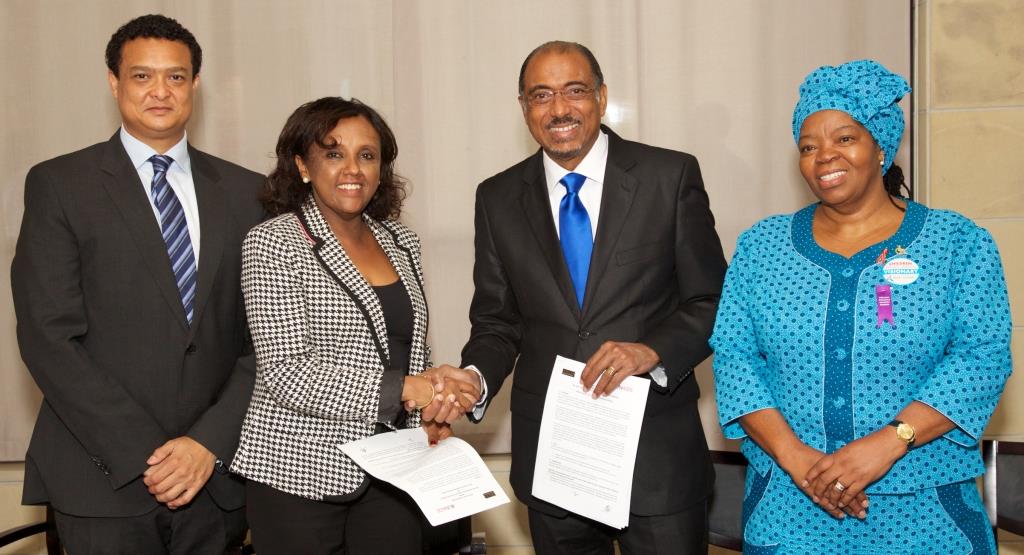MEDIA CONTACTS:
Zenawit T. Melesse (UNAIDS Johannesburg) +27 89 909 2637, Email
Corey White (ASLM) +251 11 557 1021, Email
UNAIDS and ASLM Formalise Partnership to Improve Laboratories and Access to HIV Testing
CAPE TOWN, South Africa, (8 December 2013) – The Joint United Nations Programme on HIV/AIDS (UNAIDS) and the African Society for Laboratory Medicine (ASLM) on 8 December 2013 formalised their partnership through the signing of a Memorandum of Understanding (MoU) to collaboratively improve access to HIV testing and strengthen health systems throughout Africa.
Over seven million people living with HIV in Africa are receiving antiretroviral therapy (ART). Although this is a significant achievement, it is less than 50% of all the people living with HIV who are eligible for treatment on the continent – according to the new 2013 Consolidated ART Guidelines from the World Health Organization (WHO). Health systems in Africa face a dual challenge. – First, continued expansion of access to ART for the millions of people living with HIV still in need of treatment; and second, sustaining effective treatment for patients already on ART. Through this partnership UNAIDS and ASLM will work to support countries in improving access to laboratories and HIV testing.
“We must ensure people living with HIV have access to quality laboratory services in Africa. We continue to fail children because we do not have adequate diagnostics and laboratory capacity,” said Michel Sidibé, Executive Director of UNAIDS. “HIV testing needs to be simpler, quicker, more cost-effective and more widely available, so that we can fast-track lifesaving treatments to our communities.”
Improving access to inexpensive, accurate and simple HIV and TB diagnostics is essential to the long-term effectiveness and quality of ART, which is crucial to sustaining the AIDS response in Africa and achieving the objectives of the UNAIDS 2015 Treatment Initiative. Laboratories play a critical role in expanding access to key diagnostics, and ASLM is committed to supporting these efforts through its 2020 strategic vision – strengthening laboratory workforce development, improving laboratory accreditation, harmonising regulatory systems and strengthening national and regional laboratory networks.
“Coordinated efforts, based on best practices, are essential for building effective HIV programmes, said Tsehaynesh Messele, ASLM Chief Executive Officer. “Effective implementation can produce significant benefits for millions of patients without access to HIV testing and will substantially improve the effectiveness of HIV treatment and prevention services.”
UNAIDS and ASLM will seek to support countries in Africa in implementing a structured HIV laboratory programme framework to improve HIV testing coverage, increase laboratory efficiency, lower costs and ensure improved and sustainable capacity.
###
The African Society for Laboratory Medicine (ASLM) is a pan-African professional body, endorsed by the African Union that advocates for the critical role and needs of laboratory medicine. ASLM aims to achieve the four goals of its 2020 strategic vision: building a sustainable laboratory workforce; accrediting laboratories to improve performance and quality; improving the regulation of medical diagnostic products; and building laboratory networks to improve early disease detection and collaborative research.
The Joint United Nations Programme on HIV/AIDS (UNAIDS) leads and inspires the world to achieve its shared vision of zero new HIV infections, zero discrimination and zero AIDSrelated deaths. UNAIDS unites the efforts of 11 UN organizations—UNHCR, UNICEF, WFP, UNDP, UNFPA, UNODC, UN Women, ILO, UNESCO, WHO and the World Bank—and works closely with global and national partners to maximize results for the AIDS response. Learn more at unaids.org and connect with us on Facebook and Twitter.


